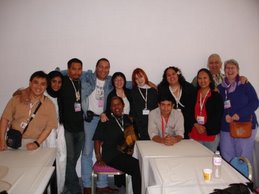Indigenous Portal Regional Editors
The Indigenous ICT Task Force (IITF) is seeking to hire eight regional Indigenous web editors to work on the Indigenous Portal website. This is a part-time paid position with opportunity for a longer period.
Overview:
The IITF was created during the World Summit on the Information Society in Tunis in 2005 by Indigenous representatives who want to implement the Plan of Action of that process.
The IITF is a non-profit organization of Indigenous individuals who are involved in the Information Society. They include educators, editors, website managers, community activists and others who have an interest is closing the digital divide between Indigenous Peoples and the rest of the world.
The IITF has created a portal at www.indigenousportal.com with one general site and regional sub-sites in eight regions of the world: North America, South America, Central American and the Caribbean, Artic, Africa, Asia, Pacific and Russia.
These regional sites will run the language most suitable to the Indigenous Peoples in their region.
The initial plan is to have one Indigenous Portal Project Manager to create and oversee the development of the portal and regional managers to maintain the portal for their particular region.
The Indigenous ICT Task Force (IITF) is seeking to hire eight regional Indigenous web editors to work on the Indigenous Portal website. This is a part-time paid position with opportunity for a longer period.
Overview:
The IITF was created during the World Summit on the Information Society in Tunis in 2005 by Indigenous representatives who want to implement the Plan of Action of that process.
The IITF is a non-profit organization of Indigenous individuals who are involved in the Information Society. They include educators, editors, website managers, community activists and others who have an interest is closing the digital divide between Indigenous Peoples and the rest of the world.
The IITF has created a portal at www.indigenousportal.com with one general site and regional sub-sites in eight regions of the world: North America, South America, Central American and the Caribbean, Artic, Africa, Asia, Pacific and Russia.
These regional sites will run the language most suitable to the Indigenous Peoples in their region.
The initial plan is to have one Indigenous Portal Project Manager to create and oversee the development of the portal and regional managers to maintain the portal for their particular region.
The project is funded through Swiss Agency for Development and Cooperation (SDC), initially facilitated by INCOMINDIOS, a Swiss based NGO and carried by the IITF. The project is at the moment co-managed and the entire management will gradually be passed to the Permanent Portal Board consisting of Indigenous representatives from eight regions of the world and the IITF as the carrying organisation. By the end of the project the Permanent Board and the IITF will be the sole entities managing and carrying the project.
This project is very dynamic and challenging and will require an Indigenous person with the skills and experience to meet this demanding opportunity.
The position as a Indigenous Portal Regional Editor is perfect for a dynamic, insightful, well-organized, detail-oriented individual or ORGANIZATION with a passion for information and communication technologies and international development. The ideal candidate is a strong writer and communicator, technology savvy and able to share the vision of the project. She/he is also an effective planner and able to contribute to the overall strategic development and implementation of this exciting project. This person is someone who is goal-oriented and able to work well both independently and collaboratively.
Job Description
Content
- Regularly gathering and uploading fresh, accurate and reliable content, such as news, in the region of responsibility
- Finding and updating new resources of information for the website
- Ensuring that the designated language(s) content will be provided
Editorial
- Researching, collecting and requesting content added to site
- Working with the Indigenous Portal Project Manager to update featured topic every few weeks
Tech Support on Site Usage
- Working with technical team to co-ordinate site maintenance
Community Outreach
- Acting as a contact for their language community
- Creating excitement about the website and the community
- Facilitating, supporting and growing the online community
- Find ways in which the site may be improved to better support community projects.
Research
- Undertake ongoing research, reporting and recommendation development with the support of other team members
- Write progress reports every three months
Qualifications that are an asset but not obligatory
• Knowledge of issues around telecentres and community-building technology.
• Understanding and use of communications technologies including blogs and content management systems.
• Understanding of internet culture and enjoy spending time online
• Ability to network with people
• Strong written and oral communications skills, with an enthusiasm for sharing ideas and an ability to translate them into actions. Fluency in a relevant language (English/ Spanish/French). Multiple languages are an asset.
• Work experience in the non-profit and/or technology sector (ideally with a focus on Information and Communication Technologies for Development).
• Travel experience in developing countries with an understanding of internet access issues and the objectives and challenges of telecentres an asset.
• Experience with the media.
• Creative thinker and problem-solver.
• Ability to manage multiple shifting priorities and large amounts of information.
• Ability to work in multicultural and "skill-diverse" teams
• Strong knowledge of international issues, human rights and development, with a particular focus in information and communications technologies.
Application Process:
Electronically submit a cover letter expressing your interest in this position, your curriculum vitae (CV), and a listing of two references to:
The Indigenous Portal Board Members
indigenousportal@gmail.com
An email confirming the receipt of your application will be sent to you upon receiving all documents.
Deadline for application- February 28, 2008
Position starts: ~ 2008 (tba)




